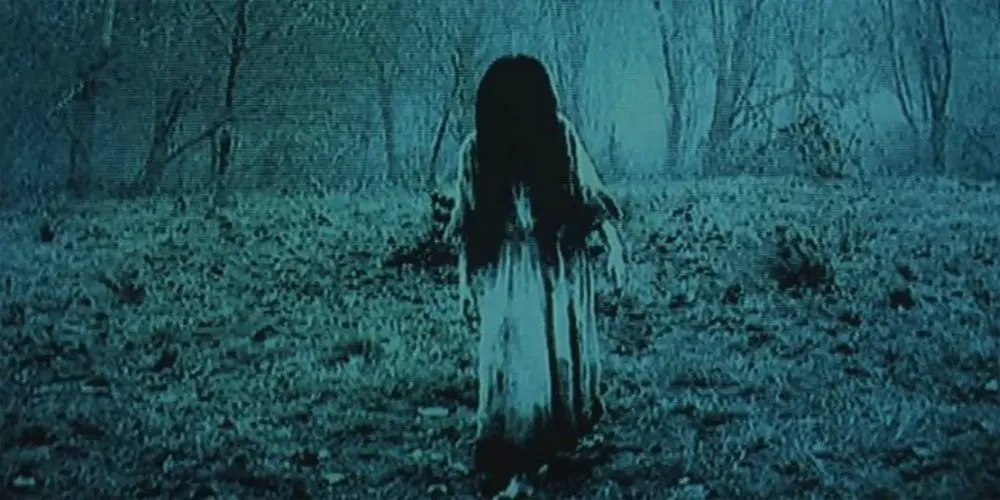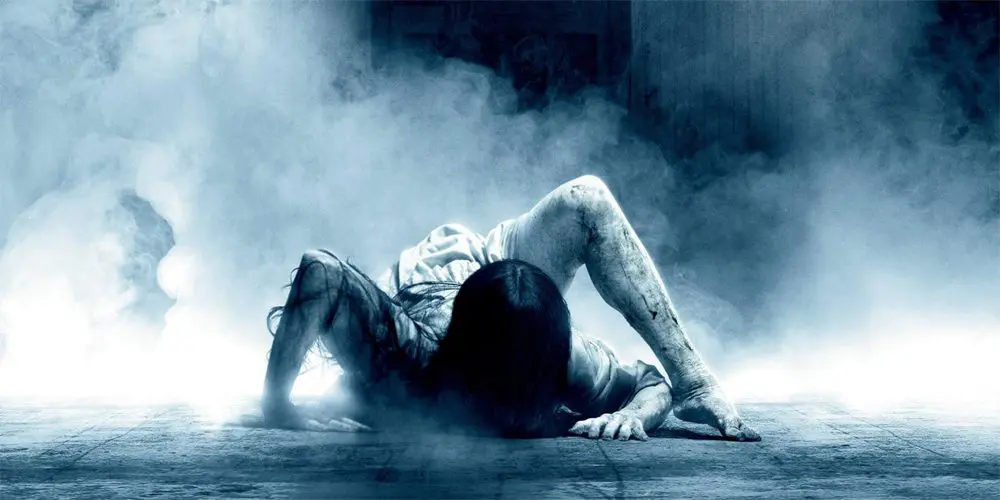You watch it, and then you die.
No, wait, sorry. That isn’t right. You watch it, then you get a phone call, and then you die. After seven days. After, or within? I’m not sure. Besides, if you make a copy of it, and then make someone else watch it, they die. After their own phone call, and their own seven days. What happens to you? Unclear. You probably die, too. Why not? It’s that kind of movie. Everyone dies.
What’s “it”? Until this year, it was a VHS tape. It still kind of is, but Rings, the third American rehashing of the celebrated Japanese 1998 horror, Ringu, wants to lay a clammy finger on the pulse of always-online topicality. So now it’s a computer file. Its contents are mostly the same; a twitchy, pulsating black-and-white medley of buzzing insects, crucifixes, snakes eating their own tails, and, eventually, a young girl with her face draped in pitch-black tresses, dragging herself up and out of a stone well. Say hello to Samara. She’s into heavy metal, centipedes, and reality TV. She’s very pleased to meet you.
No need to exchange numbers – Samara already has yours. If you watch her tape she’ll give you a call, and a week later she’ll slither through your TV and try to kill you. A lot of my relationships have gone that way, and so has every previous movie featuring Samara. The only wrinkle this new one adds is the pliability of file-sharing; now you can pass her curse on like a case of the playground cooties. This isn’t an inherently bad idea for rejuvenating the franchise. It allows Gabriel, a down-with-the-kids college professor, to set up an experiment wherein a bunch of volunteer students all watch the tape and pass it around among themselves. This isn’t intended as a commentary on college-age promiscuity, but it mostly works as one. Gabriel is played by The Big Bang Theory’s Johnny Galecki, and he’s cast so against type that at one point a student, Holt (Alex Roe), describes him as “a bit of a badass,” and it might be the most absurd thing ever spoken aloud in the history of humankind.

Holt’s girlfriend, Julia (Matilda Lutz), gets wind that something’s up, and arrives on campus looking for answers. She finds more questions, and eventually Samara’s file. The version she watches is different. The images within are similar – this is a series that has always, ironically, gone to the well a little too often – but there’s a grim consistency to the flooded church and the crucifix of buzzing cicadas. They’re clues. If Julia, Holt and Gabriel can follow them, then maybe, just maybe, they can unravel Samara’s knotty origins.
Digitizing the format might have opened up the material. With Gabriel supervising his student cult, and the liberal use of Skype and social media, the first act of Rings feels as if it’s trying to do that, much like how the vastly-superior Unfriended, from 2014, found something terrifying about student screen-shares. But once the search leads to Sacrament Valley, a quaint rural town built on a bedrock of clichés, you realise this road trip is taking the same route as always. There’s a creepy lady who runs the rooming house, photos on the walls that hint at the town’s dark secrets, and Vincent D’Onofrio as a blind local who might know a little more than he’s letting on. (Spoiler alert: he does.)
Ringu saw the encroaching technological age as a terrifying future; Rings doesn’t seem to realise we’re already living in it. Samara might be one of horror cinema’s most enduring villainesses, but she’s behind the times now. So is Rings. It’s a ho-hum ghost story the likes of which we’ve seen many, many times before. It isn’t scary, nor does it find a new angle from which to peer warily at our computers. Here’s one file that’s better off in your recycle bin.




